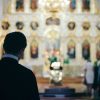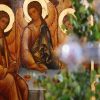The stores get a jump on things when it comes to Christmas. They begin decorating and advertising many weeks in advance to give us plenty of time to buy gifts and be prepared for the big day with family and friends. The Church has done something similar for centuries. Orthodox Christians are already in the preparation period since November 15th (28th). We call it “Christmas Fast.” The Church calls us to spiritual attention through prayer, worship, reflection on the most important issues of life and a disciplined diet to prepare for a true celebration of the birth of Christ.
A well-known hymn of Christmas is already being sung at Matins. And a few decorations are appropriate. “Christ is born, glorify Him! Christ from heaven, come to meet Him! Christ on earth, be exalted! Sing to the Lord, all the earth! Praise in gladness, all people, for Christ has been glorified!” The center of Christmas is Christ. We celebrate the birth of Christ as the Incarnation of God, the mystery of God’s loving embrace of conflicted and suffering humanity. “For God so loved the world that He gave His only Son, that whoever believes in Him should not perish but have eternal life” (John 3:16).
Today’s Gospel (Luke 13:10-17) tells about the healing on the Sabbath day. The Lord was teaching in a synagogue in Galilee. We can imagine Him drawing from the rich themes of the Old Testament and expounding on God as a loving Father, a God of righteousness and mercy, a God who loves and cares for the poor, the needy, the oppressed. In that synagogue there was a woman who much needed God’s help. The woman had developed a physical ailment. She was bent over and unable to straighten her back.
She was a courageous lady. She had to deal with a disability. A big burden. Consider for a moment trying to converse with someone while being unable to straighten up and look in the face of the other person. This is an affliction that could cause many to isolate and stay home in order to avoid the public gaze. But this lady had grit. Whatever her inner feelings about her burden, she resisted giving up and pressed on with life. Her faith in God empowered her to put aside personal discomfort and join in the public prayers at the synagogue. For her faith and courage, this lady was surely worthy of God’s praise and blessing.
She said nothing. But Jesus, who took the initiative, knew her heart. The Lord called to her and said, “Woman, you are freed from your infirmity.” He touched her with His holy hands and He healed her. She had been sick for eighteen years but now, amazingly, she was able to straighten herself up, giving thanks to God. Christ came to the world not only to save and to teach, but also to heal and comfort. A prophecy in the book of Isaiah foretold the blessings of the Messiah this way: “He took our infirmities and bore our diseases” (Isaiah 53:4; Mat. 8:17). Christ lifts the burdens of our bodies and souls, uplifting us up, and strengthening us to walk with courage and freedom.
Our society is in a bit of a mess. We live in difficult and confusing times. A new variant of the epidemic threatens health. Economic inflation is worrisome to say the least. Shootings and other forms of violence never seem to cease. And many of us deal with personal and family issues of one kind or another. Metaphorically, we resemble the woman of today’s Gospel, needing healing and relief. Our backs are weighed down and pressed to the ground by burdens and worries. It is a good thing to turn to Christ, the carrier of burdens, and to remember His words: “Come to me, all who labor and are heavy laden, and I will give you rest. Take my yoke upon you, and learn from me; for I am gentle and lowly in heart, and you will find rest for your souls. For my yoke is easy, and my burden is light” (Mat. 11:28-30).
Is Christ’s yoke truly easy and His burden really light? How can that be so when, in doing good and speaking the truth, Christ was persecuted, reviled, and at the end crucified? And yet that is the paradox of His life, beginning with His birth and the meaning of Christmas itself. Because what makes Christ’s yoke easy and His burden light is the power of divine love by which He lifts our fears and our worries. To the degree we believe in Christ and abide by His love, our fears are relieved, our worries are diminished, life begins to shine with joy. Here we discover the meaning of Christmas, the invincible message of love, freedom from fear, hope of peace, a life of joy among humans. St. John the Evangelist proclaims the eternal message of Christmas when he writes, “All things were created through [Christ]; in Him was life, and the life was the light of humans. The light shines in the darkness, and the darkness has not overcome it . . . All who received Him, who believed in His Name, He gave power to become children of God . . . The Word became flesh and dwelt among us, full of grace and truth; we have beheld His glory, glory as of the only Son from the Father” (John 1:2-4, 14).
In recent weeks I have been reading some interesting books. By focusing on significant issues of life and history, democracy and modern times, issues that shed light on human relations, marriage, family and friendships, I find that my prayers are uplifted and strengthened too. One of those books helped me to see the meaning of Christmas in a new light and to catch glimpses of how the yoke of Christ is easy and His burden light for those who have committed their life to Christ. The title of the book is For the Life of the World, authored by Miroslav Volf and Matthew Croasmun of Yale Divinity School. The book lays out a Christian vision of life as true life, as a creative and flourishing life based on three simple principles: 1) life being led well, 2) life going well and 3) life feeling as it should. To repeat these three principles: life guided and led well, life moving forward and going well, and life feeling right as true life always should. That sounds pretty simple but how does it work?
Well, the three principles of a true life—life led well, life going well, and life feeling as it should—are tied to a significant biblical text. In Romans 14:17 St. Paul writes, “The kingdom of God is not food and drink but righteousness and peace and joy in the Holy Spirit.” In other words, the kingdom of God is defined by righteousness, peace and joy in the Holy Spirit. As much as we practice righteousness, peace and joy with the help of the Holy Spirit, there we find the presence and energy of God’s kingdom, whose essence is divine love. And divine love creates true and flourishing life.
To put it another way. First, when is life led and guided well? When we practice righteousness with the help of the Spirit’s grace. The source of righteousness is always God in His eternal love. Righteousness is another word for justice. Justice is another word for loving concern and self-giving toward others. When we practice loving justice in all our relationships: in marriage, in family, in work, in society and everywhere else, God’s kingdom energizes our lives to put things right and to set things straight. The practice of righteousness, including forgiveness, is a restorative justice which reconciles and heals human relationships, and brings calm and unity to family and society.
Second, when is life moving forward and going well? When human beings experience sentiments of peace. We should strive for peace through justice. Peace is the calm and harmony that follows the doing of justice. Peace can never be found apart from justice and righteousness, whether in a family, a school, a place of work or a nation. Peace is the delicate fruit of restorative righteousness, a blessing of the Holy Spirit, a crowning of human life in cooperation, unity, harmony.
And third, when does life feel right as it should? When life is graced with joy. Joy is the sweet measure of the goodness of life, when human beings in their relationships strive for peace and find cooperation and unity. Joy is the natural and delicious fruit of peace and peaceful working relationships as we practice righteousness and strive for peace in all things, and always in the spirit of prayer and with the help of the Holy Spirit.
We could say that the yoke of Christ, which is easy, as He says, is His message of the kingdom of God, a message He asks all His followers to embrace. And the burden of Christ, which is light, is Christ’s divine love, the essence of God’s kingdom, which Christ asks all His followers to live by. The yoke of the kingdom and the burden of divine love are energized and transformational, and thus easy and light, to the degree our faith and our commitment are devoted to the practice of godly righteousness, peace and joy in our lives. That’s the cost of being disciples of Christ. If we duck the cost of discipleship, the yoke and burden of Christ become impossible. If we embrace the cost, and allow the Holy Spirit to do its work in our lives, then true life, a creative and flourishing life, is God’s rich blessing to us. And the angels in heaven dance for joy on our behalf.
“The kingdom of God is not food and drink but righteousness and peace and joy in the Holy Spirit” (Rom. 14:17). In other words, beginning with His birth, the kingdom of God and the true meaning of Christmas, as embodied in Christ, is not defined by feasting on food and drink, nor by social celebrations and gift giving as such, although food and drink and gift-giving are positives. Rather, the kingdom of God is God’s passionate desire to inhabit the earth, to be God Emmanuel, God-with-us, to come and dwell in the Church and society, to fill with divine love, homes and families and all creation in beauty and truth. The kingdom of God is God’s personal presence in Christ and the Holy Spirit, a holy incursion of love breaking powerfully into the nitty-gritty of daily life and transforming ordinary life into a promise of true and flourishing life that we celebrate on Christmas.
As we look forward and prepare for Christmas, let us pray again and again: Come, Emmanuel, be with us and stay with us! Come, Holy Spirit, and work righteousness, peace and joy among us! Praise God, Father, Son and Holy Spirit! Amen.

















